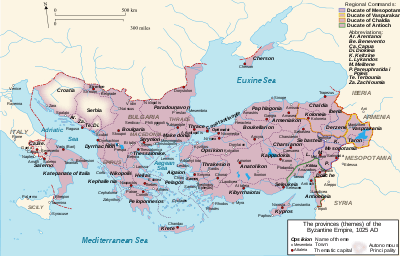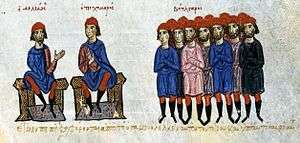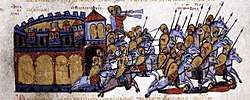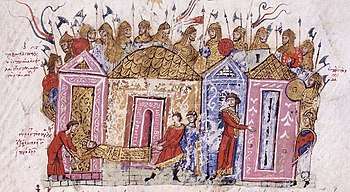Uprising of Peter Delyan
The Uprising of Peter Delyan (Bulgarian: Въстанието на Петър Делян, Greek: Επανάσταση του Πέτρου Δελεάνου), which took place in 1040–1041, was a major Bulgarian rebellion against the Byzantine Empire in the Theme of Bulgaria.[1] It was the largest and best-organised attempt to restore the former Bulgarian Empire until the rebellion of Ivan Asen I and Petar IV in 1185.
| Uprising of Peter Delyan | |||||||
|---|---|---|---|---|---|---|---|
 Peter Delyan is proclaimed Emperor of Bulgaria in Belgrade. | |||||||
| |||||||
| Belligerents | |||||||
| Bulgarian rebels | |||||||
| Commanders and leaders | |||||||
|
Peter Delyan Tihomir Alusian | |||||||

Prerequisites for the uprising

After Byzantine troops conquered Bulgaria in 1018, Basil II wisely decided not to change the Bulgarian taxation system in order to placate the population. Although the Bulgarian Patriarchate was downgraded to Archbishopric, its head remained an ethnic Bulgarian till Basil II's death in 1025. Under the rule of Emperor Romanos III the population was forced to pay its taxes in coin rather than in goods-in-kind, which caused poverty and widespread unrest.
Initial progress
In 1040, Peter Delyan, who claimed to be a descendant of Samuil of Bulgaria escaped from Constantinople and began roaming throughout the Bulgarian lands, eventually reaching Morava and Belgrade. The rebellion broke out in Belgrade, where Delyan was proclaimed Emperor of Bulgaria[2] assuming the name of the sainted Emperor Peter I. The Bulgarians moved southwards towards the last political centres of their Empire, Ohrid and Skopje. On their way the local population joined them, accepted Peter Delyan for its Emperor and killed every Byzantine they met.[3] In the same time local Bulgarians from the Dyrrhachium area gathered around the soldier Tihomir[4] and headed westwards to reach the old capitals. The existence of two separate rebel camps[5] became an actual threat for the success of the rebellion. Petar Delyan wrote a letter to Tihomir to negotiate for joint actions and made a speech in which, in figurative language, he told the assembled people that as it was not possible for two parrots to the share a bush without discord, so two emperors could not share one country[6] and that they should chose only one leader, either him or Tihomir. He deliberately used the parrots because the two parrots used to be the coat-of-arms of the Comitopuli House. As he had greater influence than his rival, Delyan was unanimously chosen as leader and Tihomir was killed.[7]
With his enlarged army Petar II advanced to the south, surprised and defeated the Byzantine Emperor Michael IV the Paphlagonian at Thessaloniki[8] taking his treasury. One of Michael's commanders the Bulgarian Manuel Ivats, probably a son of Samuil's boyar Ivats[9] joined Peter II.[10] After the victory the Bulgarian troops under the voivoda Kavkan captured Dyrrachium on the Adriatic Sea and some forces penetrated deep into Thessaly eventually reaching Corinth. Albania, Epirus and most of Macedonia were conquered. Another Bulgarian army led by Antim marched deep to the south and defeated the Byzantine commander Alakaseus in the battle of Thebes in Boeotia. Upon the news of the Bulgarian success the Byzantine population of Athens and Piraeus who were uneasy due to the heavy taxes also revolted but were quickly crushed by Norman mercenaries.[11] The decisive actions of the rebels caused serious anxiety in Constantinople where plans for crushing the rebellion were hastily discussed.
Arrival of Alusian

Life

.svg.png)
Soon the news for the Bulgarian uprising reached Armenia, where the descendants of the last Bulgarian Emperors were deported. The most respected of them was the son of the last Emperor Ivan Vladislav, Alusian. Disguised as a mercenary he reached Constantinople and despite the strict security measures managed to go to Bulgaria in September 1040. The appearance of a new pretendent for the throne meant new tensions among the rebels. In the beginning Alusian did not dare to reveal his origin but tried to find devoted supporters of his kin. He proved his claims with a black spot on his right elbow and soon gathered many adherents.
Petar II Delyan warmly welcomed his cousin although he knew that Alusian might be a potential candidate for the crown. He gave him a 40,000 strong army to seize Thessaloniki but he failed, having attacked the enemy with a tired army. The defeat cost 15,000 dead and Alusian fled from the battle field leaving his arms and armour.
The treason of Alusian

The heavy defeat sharply worsened the relations between the two leaders: Alusian was ashamed by the defeat and Petar Delyan suspected treason. Alusian decided to act first and plotted against his cousin. He invited Delyan to a feast, where his followers served the Emperor many cups of wine. When Petar got drunk on the wine, the conspirators came down on him and pulled out his eyes with a knife. Thus Alusian became the single leader. In the beginning he undertook active operations but was defeated again and had to flee for his life. Then he secretly negotiated with the Byzantines. After they reached an agreement in the summer of 1041, Alusian pretended to give a decisive battle, but when the two armies met he abandoned his troops and changed sides.
Suppression of the uprising

The Byzantine Emperor Michael IV prepared a major campaign to finally defeat the Bulgarians. He gathered an elite army of 40,000 men with capable generals and moved constantly in a battle formation.[12] There were a lot of mercenaries in the Byzantine army including the Norwegian Prince and later King Harald Hardråde with 500 Varangians. From Thessaloniki the Byzantines penetrated in Bulgaria and defeated the Bulgarians at Ostrovo in the late summer of 1041. It seems that the Varangians had a decisive role in the victory as their chief is hailed in the Norse sagas as the "devastator of Bulgaria". Though blind, Petar Delyan was in command of the army. His fate is unknown; he either perished in the battle or was captured and taken to Constantinople.
Soon the Byzantines eliminated the resistance of Delyan's remaining voivodes, Botko around Sofia and Manuil Ivats in Prilep, thus ending the Bulgarian revolt.
Footnotes
- A world history of tax rebellions: an encyclopedia of tax rebels, revolts, and riots from antiquity to the present, David F. Burg, Taylor & Francis, 2004, ISBN 0-415-92498-7, pp. 74–75.
- М. Psellus, pp. 61, 64
- Skуl.-Cеdr. p. 527
- Skyl.-Cedr. p. 528
- Zonaras, p. 145
- Zonaras, pp. 145–146
- Skyl.-Cedr, pp. 528–529
- М. Аttаlеiаtes, p. 9
- Златарски, В. История на България, p. 758
- Skyl.-Cedr., p. 529
- Hopf, Geschichte Griechenlands im Mittelalter (German: History of Greece in the Middles Ages) (Ersch — Gruber, 85), p. 147
- J. Herrin, Byzantium: The Surprising Life of a Medieval Empire, p. 222
- Йордан Андреев, Милчо Лалков, Българските ханове и царе, Veliko Turnovo, 1996.
- The uprising of Peter Delyan (in Bulgarian)